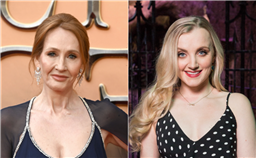Evanna Lynch is the latest “Harry Potter” star to comment on the ongoing controversy regarding author and franchise creator J.K. Rowling’s gender beliefs, which have been routinely criticized for being anti-transgender. Lynch starred in the “Harry Potter” film franchise as the quirky Luna Lovegood. Back in 2020, Lynch deleted her Twitter after commenting on Rowling’s controversy. The actor said “it’s irresponsible to discuss such a delicate topic” as transgender rights on Twitter and “I wish [Rowling] wouldn’t,” but she added, “That said, as a friend and admirer of Jo I can’t forget what a generous and loving person she is.”
Lynch received blowback at the time for supporting Rowling. In a new interview with The Telegraph, Lynch opened up about her relationship with the controversial author. The two first linked up long before Lynch joined the “Harry Potter” movies. The actor was 11 and living with anorexia and wrote a letter to Rowling about her struggle. The author responded and sent Lynch “incredible, wise letters” while she was in recovery.
“I was very naive when I was dragged into that conversation,” Lynch now said about originally commenting on Rowling’s anti-trans controversy in 2020. “I didn’t even know there were two sides. I had a view of, like, good and bad. I do have compassion for both sides of the argument. I know what it was like to be a teenager who hated my body so much I wanted to crawl out of my skin, so I have great compassion for trans people and I don’t want to add to their pain.”
“I do also think it’s important that J.K. Rowling has been amplifying the voices of de-transitioners,” she continued. “I had this impulse to go, ‘Let’s all just stop talking about it’, and I think probably I’m a bit braver now about having uncomfortable conversations.”
Lynch said the backlash against Rowling has surprised her, “especially when she wrote her essay [revealing experiences in her unhappy first marriage]. I just felt that her character has always been to advocate for the most vulnerable members of society. The problem is that there’s a disagreement over who’s the most vulnerable. I do wish people would just give her more grace and listen to her.”
Lynch’s “Harry Potter” co-stars remain divided over the Rowling controversy. Daniel Radcliffe immediately opposed Rowling’s views in an an open letter in which he proclaimed, “Transgender women are women.”
“The reason I felt very, very much as though I needed to say something when I did was because, particularly since finishing ‘Potter,’ I’ve met so many queer and trans kids and young people who had a huge amount of identification with Potter on that,” Radcliffe told IndieWire last year about speaking out against Rowling. “And so seeing them hurt on that day I was like, I wanted them to know that not everybody in the franchise felt that way. And that was really important.”
Voldemort actor Ralph Fiennes, on the other hand, has slammed the blowback against Rowling as “disgusting” and “appalling.” Helena Bonham Carter, who starred as the villainous Bellatrix Lestrange in four “Harry Potter” films, also called the backlash “horrendous” and “a load of bollocks.”
“It’s been taken to the extreme, the judgmental-ism of people,” Bonham Carter told The Times UK last year. “She’s allowed her opinion, particularly if she’s suffered abuse. Everybody carries their own history of trauma and forms their opinions from that trauma and you have to respect where people come from and their pain. You don’t all have to agree on everything — that would be insane and boring. She’s not meaning it aggressively, she’s just saying something out of her own experience.”
Rowling remains unconcerned with how the backlash might affect her legacy. The author is the subject of the recently launched podcast series “The Witch Trials of J.K. Rowling,” in which she’s addressed the anti-trans controversy.
“What has interested me in recent years, particularly on social media [is when fans say], ‘You’ve ruined your legacy. Oh, you could have been beloved forever, but you chose to say this,’” Rowling said on the series. “And I think: ‘You could not have misunderstood me more profoundly.’ I never set out to upset anyone. However, I was not uncomfortable with getting off my pedestal.”
Read More About:
Source: Read Full Article


